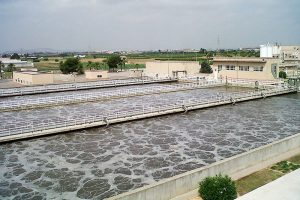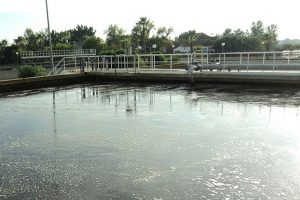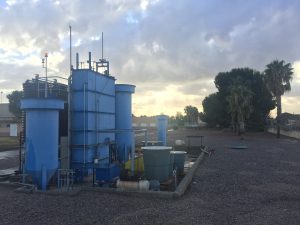Project Bactiwater
It is possible to recover the biological systems after a spill through the use of biotechnological crops, thus reducing the discharge of improperly treated wastewater into the environment

Around 80% from wastewater treatment plants in the EU have secondary treatment processes using activated sludge. Municipal sewage plants rely on the efficient and continuous processing of effluents to avoid the release of untreated wastewater and subsequent environmental and public health threats. Uncontrolled spills containing harmful substances can damage the biological units, since an increase in the toxic load of urban wastewater reduces the cleaning capacity of the bacterial culture. Such harmful increases come from uncontrolled discharges with excess toxic loads and can be seasonal. Consequently, untreated water can be released, contributing to the loss of biological diversity and degradation of water resources.
When a treatment plant operator detects that the organic or nutrient removal performance is decreasing, most of the biomass has already been damaged. The usual procedure to resume normal activity consists of increasing the air supply to the bioreactor. Considering that aeration systems can represent around 50-70% of the total energy consumption of a WWTP, an increment in energy requirements in the biological process will lead to a considerable increase in the overall energy consumption at WWTPs.
In this context, the general objective of BACTIWATER is to demonstrate that the proposed tools can reduce the environmental impact of failures and malfunctions at biological units after spills.
The whole project, including the experimental phase, will take place in Valencia (Spain).
BACTIWATER is an EU financed project in the framework of the Life Program, which is the EU’s financial instrument supporting environmental and nature conservation projects throughout the EU.
 LIFE BACTIWATER
LIFE BACTIWATER
Project LIFE16 ENV/ES/000390
Budget: 1.141.570 €
EU Contribution: 684.940 Euro (60% total budget)
About LIFE
The experimental and technical phase will take place in a demo plant at the WWTP Quart Benàger in Valencia

Photo Gallery WWTP
Project objectives
The main objective of LIFE BACTIWATER is to demonstrate that the implementation of an innovative and more energy-efficient solution will reduce the environmental impact of failures and malfunctions of
biological units after unexpected spills. This solution consists of the culture and inoculation of microbial communities specially selected to accelerate the recovery of biological processes in case of uncontrolled spills, reducing the consequent environmental impact that would occur if the bacterial population could not adequately degrade contaminants from the wastewater as a consequence of a polluting waste arriving at the WWTP.
BACTIWATER aims to optimize the active sludge process as well as to reduce energy consumption in case of pollutant spills that could reach the WWTP and affect the biological treatment. Considering that aeration systems can represent an important amount of the total energy consumption of a WWTP, an increment in energy requirements in the biological process will lead to a considerable increase in the overall energy consumption at WWTPs. It is expected that the use of BACTIWATER project results will decrease the energy consumption.
The specific objectives of the LIFE BACTIWATER Project are:
ENVIROMENTAL PROTECTION
Environmental protection from wastewater discharges and compliance with the Water Directive 91/271/EEC, ensuring that the quality parameters in the effluent of the WWTP remain below the limits established by the Directive, avoiding harmful environmental impacts.
EVALUATION
Economic and environmental evaluation of the recovery of the biological process through the use of BACTIWATER after several artificial spills on a pilot scale
VALIDATION
Validation of an early detection diagnostic kit for malfunctions in the biological process
PROTOCOLS
Elaboration of prevention and correction protocols for biological treatment failures in WWTPs
OMICS TOOLS
Promotion of new omics tools as diagnostic methodologies in wastewater treatment control
REDUCTION OF ENERGY CONSUMPTION
Reduction of energy consumption in the regeneration process according to the European target of 20% increase in energy efficiency by 2020
PROTECTION OF COMMUNITY WATERS
Protection of Community waters in accordance with the Water Framework Directive 2000/60 / EC
STRATEGY
Contribution to the European water innovation strategy
KNOWLEDGE BASE
Development of a knowledge base to support beneficiaries and stakeholders with future water treatment regulations
DISSEMINATION
Dissemination and transfer of the project results to the interested parties to ensure the sustainability and transferability of BACTIWATER methods
EXPLOITATION PLAN
Elaboration of an exploitation and commercialization plan for the project results
Expected results
The main expected result of LIFE BACTIWATER project is to develop a corrective treatment of biological failures in WWTPs based on bacteria and growth enhancers. Some of the advantages that this treatment will entail are:
- Obtaining an early detection kit for malfunctions in the biological process that will allow the recovery of the biological system.
- Anticipation of 20% of biological failures and elimination of the environmental impact.
- Anticipation of up to 20% of biological failures due to planned anthropogenic actions such as pest control treatments or cleaning operations.
- Standardization of a prevention and correction protocol for optimization and recovery of the biological system in case of malfunctions.
- Elaboration of a decision-making system based on the historical database of discharges in WWTPs and its effects
- Obtaining a corrective treatment for biological malfunctions in WWTPs based on the bacterial population present in the activated sludge and its nutritional requierements.
- Elaboration of a decision-making system based on the historical database of discharges in WWTPs and its effects.
- Development of an action protocol for biological malfunctions in EDAR at European level.
- Reduction of 20-22% of the energy consumption necessary to recover the biological system in case of malfunctions.
- Optimization of the nitrification process in WWTPs and as a consequence, reduction of the nutrient load of the effluent.
- Improvement of cooperation and networking between public bodies and stakeholders of the water sector.
Project stages
The BACTIWATER project will run during 30 months, from 1st September 2017 to 28th February 2020 during which following actions will take place:
A. PREPARATORY ACTIONS
A1. Spill database and historical analysis
This project phase has a duration of two months (from September to October 2017) and deals with the compilation of discharge events at the Quart Benàger WWTP during the last 10 years, the historical database updating, as well as the determination of the most relevant microbial profile in the nitrification and denitrification process. In order to determine the most favorable bacterial profile for BACTIWATER, the influence of external factors such as climate, season, temperature and geographical location will be strongly considered.
B. IMPLEMENTATION ACTIONS
Action B includes the adaptation and commissioning of the demonstration plant for the development of the trials. The duration of actions B comprises from the beginning of the project in September 2017 until the end of project in February 2020.
B1. Demonstration plant adaptation and commissioning
The objective of this action is the adaptation and commissioning of the pilot plant where the trials will take place. During the project experimental stage, it is expected to assess how the contribution of different microbiological cultures can improve the biological process considering the effluent quality and energy consumption from the aeration equipment.
The pilot plant is located in the WWTP of Quart-Benàger and was built using the structure of an existing plant, after having checked and adapted the equipment. Furthermore, a new equipment was to guarantee the significance of the results obtained.
B2. Manufacturing of microbial enhancers
In this phase, microbial cultures have been selected as well as the most favorable culture and nutrient medium for the nitrifying and denitrifying bacteria of the biological system.
B3. Experimental phase
According to the historical discharges occurring at Quart Bènager WWTP, spills are divided generically into four types: surfactants, pesticides, heavy metals and organic load increases. Due to this type of compounds and that they usually affect the processes of many other treatment plants (not only in the Valencian Community but also at national and European level), the time reduction for the recovery of the process will be demonstrated through the addition of the bacterial preparations obtained in activity B2.
B4. Implementation of an early detection protocol
The objective of this project phase is to develop an early detection kit of biological malfunctions based on PCR techniques. Specific primers will be designed to detect bacteria or a group of bacteria that can act as markers.
B5. Business plan
A business model will be developed to establish the foundations of an exploitation plan that will take into account current market strategies, profitability and patentability.
C. MONITORING OF PROJECT ACTIONS IMPACT
This project action deals with the evaluation of the technical-economic viability of the project results with the aim of a future commercialization. The duration of stage C includes from the beginning of the project in September 2017 until the end of the project in February 2020.
C1. Environmental and economical feasibility
This phase of the project deals mainly with the economic analysis that will determine the total costs, as well as the evaluation of the economic viability. Different methodologies will be used, such as Life Cycle Cost Analysis and Techno-Economic Evaluation.
C2. Monitoring and measuring of LIFE performance indicators
During the project impacts monitoring, the following indicators will be considered: reduction of CO2 emissions, better use of natural resources, reduction of the energy consumption, acceptance in the market, communication and dissemination of project results.
Water and energy consumption will be strongly considered during the production of bacteriological enhancers as well as the use of recycled wastewater during the project.
D. DISSEMINATION AND COMMUNICATION OF RESULTS
D1. Dissemination planning and execution
During the project development, the dissemination of results, status of the project, as well as the development of social networks will be carried out. Through the dissemination of the main project results and lessons learned at national and international level, it is expected to raise the awareness of stakeholders and demonstrate the effectiveness of BACTIWATER results. These results will be communicated and disseminated to the most relevant stakeholders through different methods.
As a part of the dissemination plan, a Notice Board and several leaflets have been printed and distributed. The first BACTIWATER leaflets were distributed at the EFIAQUA water fair held in Valencia in 28-30 th November 2017.
In the “News and Events” section of this website you can consult our dissemination activities.
The Noticeboard, leaflet and Layman report can be downloaded in the “Project Documents” section.
E. PROJECT MANAGEMENT
E1. Project Management Planning
During the project phase E1 the consortium agreement and confidentiality agreement between the partners was agreed and signed. The consortium agreement is based on the directives of the LIFE program and is considered as compulsory.
During this phase a group of experts was formed as backstopping, in order to support our project.
E2. Overall Project Management
For an optimal project management, some bases of organization, communication and coordination meetings were established, as well as a project management monitoring.
E3. After-LIFE Planning
In this final phase of BACTIWATER, an exploiting strategy of the project results will be defined considering similar lines of research, as well as stakeholders and sustainability of the proposed solutions or results.
Date actualization: February 2021
ACTION A
Sep 2017 / Dec 2017
ACTION B
Sep 2017 / Feb 2020
ACTION C
Sep 2017 / Feb 2020
ACTION D
Sep 2017 / Feb 2020
ACTION E
Sep 2017 / Feb 2020
Networking
 |
ECOdigestion LIFE13ENV/ES/000377 Automatic control system to add organic waste in anaerobic digesters of WWTP to maximize the biogas as renewable energy i+d+i.residuales@globalomnium.com www.ecodigestion.com |
 |
NEWEST LIFE16 ENV/ES/000156 New urban wastewater treatment based on natural coagulants to avoid phosphorus pollution allowing mud’s agrivalorization contacto@servyeco.com www.lifenewest.eu |
 |
TECMINE LIFE16 ENV/ES/000159 Innovative techniques for mine restoration http://www.agroambient.gva.es/en/web/medio-natural/acerca-del-proyecto |
 |
EMPORE LIFE15 ENV/ES/000598 Development of an efficient and sustainable methodology for the elimination of emerging contaminants at WWTPs info@life-empore.org http://www.life-empore.org/en/ |
 |
OMZET LIFE10 ENV/NL/000028 Waste water treatment as energy and mineral recovery utility HvanVeldhuizen@Vallei-Veluwe.nl https://www.omzetpuntamersfoort.nl/english/ |
 |
in brief LIFE14 ENV/ES/000427 Integrated business model for turning Bio-waste and sewage sludge into renewable energy and agri-urban Fertilizers fbosch@aidimme.es http://www.lifeinbrief.eu// |
 |
DEMINE LIFE16 ENV/ES/000218 Decreasing the impact of abandoned mines info.beta@uvic.cat http://mon.uvic.cat/life-demine/ |
 |
Clean up LIFE16 ENV/ES/000169 Validation of adsorbent materials and advanced oxidation techniques to remove emerging pollutants in treated wastewater OPRI@UCAM.EDU http://mon.uvic.cat/life-demine/ |
 |
MCUBO LIFE15 ENV/ES/000379 Modelling, Measurement and Improvement of the water management environmental impact in the food Industry info@lifemcubo.com http://lifemcubo.eu/ |










